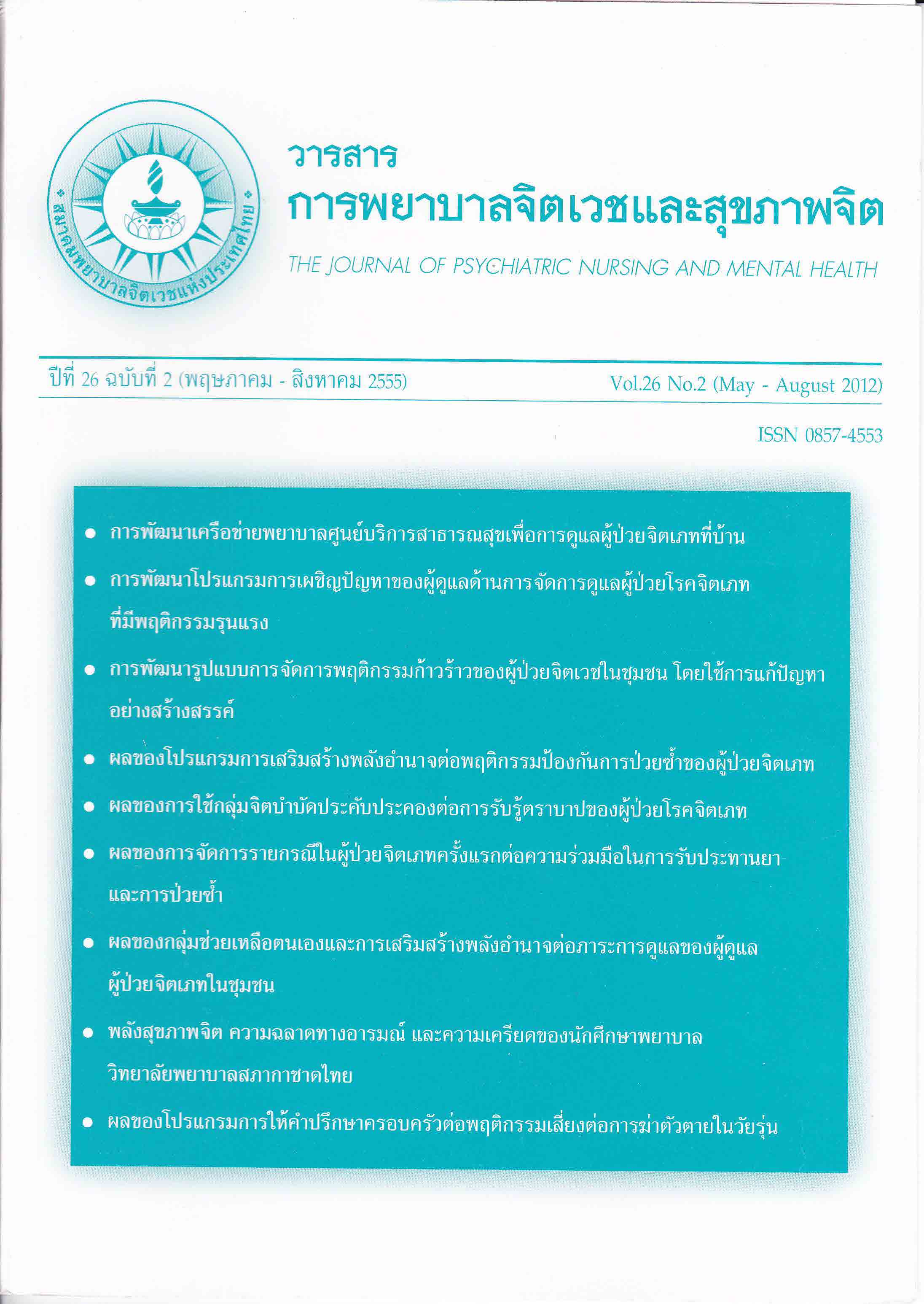ผลของการจัดการรายกรณีในผู้ป่วยจิตเภท ต่อความร่วมมือในการรับประทานยาและการป่วยซ้ำ
Main Article Content
บทคัดย่อ
บทคัดย่อ
วิจัยกึ่งทดลองนี้ เพื่อศึกษาผลการจัดการ รายกรณีต่อความร่วมมือในการรับประทานยาและ การป่วยซ้ำในผู้ป่วยจิตเภท กลุ่มตัวอย่าง คือ ผู้ป่วย นอกจิตเภท สถาบันจิตเวชศาสตร์สมเด็จเจ้าพระยา ตั้งแต่วันที่ 1 ตุลาคม 2552-30 กันยายน 2554 สุ่มตามลำดับเข้ากลุ่มทดลองและกลุ่มควบคุม กลุ่มละ 55 คน กลุ่มทดลองได้รับการจัดการ รายกรณีส่วนกลุ่มควบคุมได้รับการดูแลตามปกติ เครื่องมือการวิจัยประกอบด้วยเครื่องมือในการ ดำเนินการวิจัยและเครื่องมือเก็บรวบรวมข้อมูล วิเคราะห์ข้อมูลด้วยสถิติพรรณนาและเปรียบเทียบ ความร่วมมือในการรับประทานยาและการป่วยซ้ำ ด้วยไค-สแควร์
ผลการวิจัยพบว่า กลุ่มทดลองมีความร่วมมือในการรับประทานยาคะแนนเฉลี่ยที่ 0.76 ส่วน กลุ่มควบคุมความร่วมมือในการรับประทานยา คะแนนเฉลี่ยที่ 0.44 เมื่อเปรียบเทียบความ ร่วมมือในการรับประทานยาหลังจบโปรแกรม แล้ว 1 ปี พบว่ากลุ่มทดลองความร่วมมือในการ รับประทานยาดี 33 ราย (60.0%) กลุ่มควบคุม ความร่วมมือในการรับประทานยาไม่ดี 32 ราย (58.2%) แตกต่างกันอย่างมีนัยสำคัญทางสถิติ ที่ .01 เมื่อเปรียบเทียบการป่วยซ้ำด้วยการรับ ไว้ในโรงพยาบาล กลุ่มทดลองรับไว้ 3 ราย (5.4 %) กลุ่มควบคุมรับไว้ 16 ราย (29.1%) แตกต่างกัน อย่างมีนัยสำคัญทางสถิติที่ .05 สรุปได้ว่าการใช้ การจัดการรายกรณีทำให้เกิดความร่วมมือในการ รับประทานยา และป้องกันการป่วยซ้ำของผู้ป่วย จิตเภท
คำสำคัญ : การจัดการรายกรณี, ผู้ป่วยจิตเภท, ความร่วมมือในการรับประทานยา, การป่วยซ้ำ
Abstract
The purposes of this qausi-experimental research was to study the effect of case management on medication compliance and relapse in schizophrenic patients. The participants were randomly selected from patients with schizophrenia, who visited at the Out Patient Department of the Somdet Chaopraya Institute of Psychiatry since 1 October 2008–30 September 2010, into experimental group and control group, each group consisted of 55 participants. The experimental group received case management whereas the control group received only regular service. The instruments consisted of 2 parts: (1) Implementing instrument: the Case Management Program; (2) Data collection instrument: General questionnaire for Schizophrenic Patients, Medication Possession Ratio, Form of Relapse, and Brief Psychiatric Rating Scale. Data were analyzed by frequency, percentage, mean, standard deviation, compare of the medication compliance and relapse by Chi–square. The results were as follows: the experiment group had medication compliance score at 0.76 and the control groups had medication compliance 0.44. After program was finished in one year we found that in the experiment group, 33 schizophrenic patients (60%) had good level of medication compliance while in the control group, 32 schizophrenic patients (58.2%) had poor level of medication compliance which was significantly different (p =.01). In the experiment group, 3 patients (5.4%)while in the control group, 16 patients (29.1%) relapsed while was significantly different (p =.05). In conclusion, the use of case management provided in good medication compliance and relapse prevention among schizophrenic patients.
Keywords : Case Management, Schizophrenic Patient, Medication Compliance, Relapse
Article Details
บทความที่ได้รับการตีพิมพ์แล้ว เป็นลิขสิทธิ์ของสมาคมพยาบาลจิตเวชแห่งประเทศไทย


